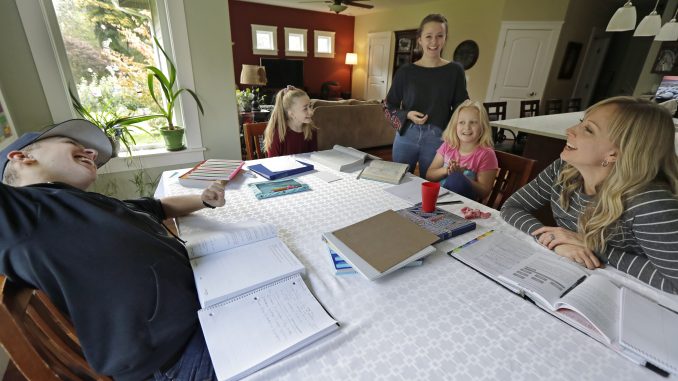
SOUTHERN PINES — There’s never been a better time for homeschool advocates in North Carolina. Since 2013 there have been more homeschooled students in the state than private school students, and if homeschooling were counted as a school district, it would be the third largest, right after Wake County and Charlotte-Mecklenburg. And now, the school closings and economic disruption from the COVID-19 pandemic are creating conditions that could further escalate this trend.
A Southern Pines-based company, Classical Conversations, is at the forefront of this growing movement, not just in North Carolina but across the nation, of parents pulling their children from government-run schools and taking a more active role in their education.
Leigh Bortins started Classical Conversations in 1997 as a gathering of 11 teenage boys in her Winston-Salem basement. Now, a couple decades later, one of those boys, her son Robert Bortins Jr, is the current CEO, and the company has moved out of the basement and is now in 43 countries and every U.S. state, with 8,000 students just in North Carolina.
Robert Bortins told NSJ that the growth of CC has tracked closely with a boom in homeschooling nationwide, as it’s gone from being seen as fringe to mainstream, with around 5% of the school-aged population now homeschooled. He believes the country is reaching a tipping point where more people will see it as a viable option for their families.
“Homeschooling has been growing about 4 to 8% a year for a while now, but I’ve seen it really, in the last 3 or 4 years, become more of a mainstream option, where it went from, ‘I could never do that,’ to, ‘Oh, I have a friend who does that.’” Bortins said.
He said the COVID-19-related shutdown of schools is also creating a lot of interest and growth, with up to 5 times more recruitment calls per day since the shutdowns. He also cited a Real Clear Opinion poll that said about 40% of parents are considering continuing to homeschool even after the schools open back up.
“And we’re seeing an uptick in book purchases. As of a week ago, we’re ahead 30% over last year. So we’re seeing a lot of indicators that people are going to stay homeschooling,” Bortins said, adding that even if only 10% of those who said they were considering continuing after the schools reopened followed through, the homeschool population would double.
The CC communities mostly switched to online, using Zoom and other digital tools, to finish off the school year. But they are planning to be back “with very limited precautions and disruptions this fall.” Bortins said their usual recommendation that those who are sick should stay home will remain the norm, “but we will encourage further hand washing and other precautions where it makes sense.”
Classical Conversations calls itself a “community-based curriculum,” but the general model is often called a homeschool co-op. The model allows for a lot of the planning, tutoring and curriculum to be done within a community, so parents aren’t left trying to reinvent the wheel and so they have a cooperative group of families to lean on for any questions or assistance.
“It really gives families that real-time support and accountability that they need to succeed, because they’re getting that weekly feedback. It’s a positive peer pressure on the kids, because they see that they need to get their work done,” Bortins said. “So that’s the big difference we see. And it gives the parents other people that are doing the same thing that they can talk to.”
The idea of classical education has a long history, seeking to use traditional knowledge and methods in teaching students. Focus is put on Latin, rhetoric, logic, classic literature and memorization.
“I think the classical model is really around the natural way that students learn,” Bortins said. “So when they’re young, they are really good at memorizing things and don’t have enough life experience to know what those things mean. So from a classical model standpoint, that’s fine. The kid can memorize the Sponge Bob Square Pants theme song, or they can memorize the periodic table. They’re going to have just as much fun memorizing the periodic table and doing it in song. And that’s going to be useful to them their entire life.”
Bortins said it is about forming an educated adult over time, not having the smartest fourth grader now. Like many classical programs, a traditional Christian worldview is also integrated into the lessons.
“We call it a Christ-centered worldview. So whether you’re Catholic or Orthodox or Protestant, we welcome you. And we welcome really anyone to join us,” Bortins said. “But we approach it through that Christian worldview lens.”
Classical Conversations communities don’t have a specific class for Bible or religion, because every class is seen through that overall lens.
“We reject the idea that you can have a separation of truth in education,” Bortins said. “So as Biblical believers, if Jesus is the way, the truth and the light, and the Lord is the word, then 2+2=4 tells us something about the nature of God. We don’t necessarily have a Bible subject that you’d see in a private school. We integrate it in math and science, and we do that through our conversation.”
He said this focus on worldview is one of the key draws for new homeschooling families as they are frustrated with public schools that try to teach values opposed to their family’s beliefs. For families concerned about their child becoming poorly socialized or that they’ll fall behind academically, Bortins said those stereotypes are not accurate. CC students, he says, are generally very social and out of the house all day, and what they learn is much more rigorous than at public schools.
Bortins pointed to testing that shows CC students have SAT and ACT scores that “are 15-30% higher than public school” and on par with the average “expensive, elite private school.” Their website touts average SAT scores of 1181 vs the national average of 1067, and an ACT average of 24.2 vs the national average of 20.9.
“We don’t have any trouble with students getting into the college of their choice and getting scholarships,” he said.
Compared with other similar programs, Bortins said they are “by far” the largest organization.
“We’re the largest classical education company in the world, and we’re the largest homeschool community-based organization in the world.”
Despite having started out so small and now being a major player in a global homeschooling movement, Bortins said, “Classical Conversation is proud to be in North Carolina, and we love it here.”


